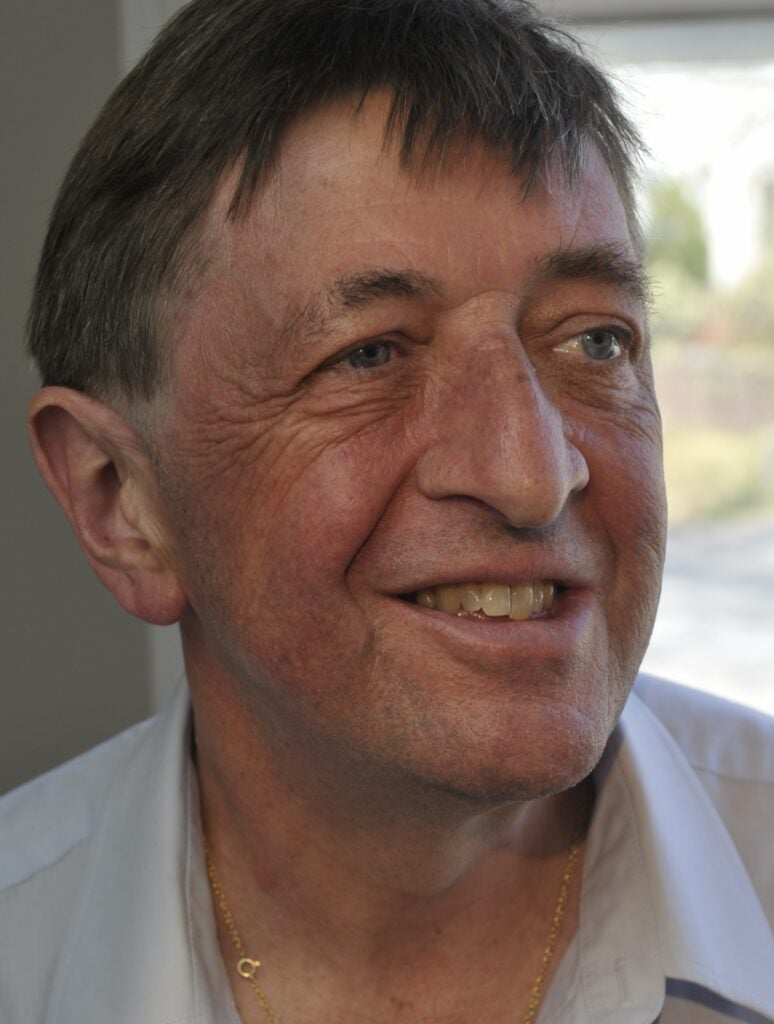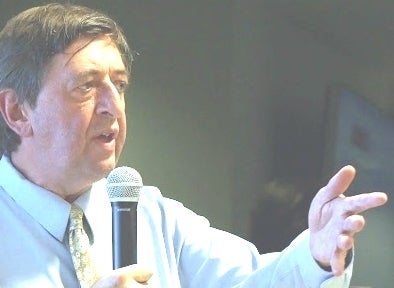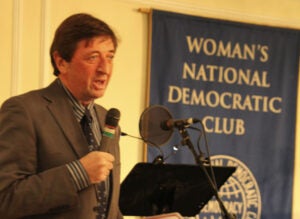CCT Professor Highlight: Mark McDonald
CCT is excited to feature Professor Mark McDonald in our latest CCT professor highlight!

McDonald has a background in economics and journalism, as he graduated from Liverpool University with an Economics degree, was editor of the University newspaper, then got a job at a local radio station covering economic stories where he found it helpful to have a background in a subject outside of traditional journalism. He received a Masters in Journalism at the University of Wales in Cardiff.
McDonald greatly enjoyed the camaraderie and experience at his first radio job and later moved to the BBC. He first started off in BBC radio, then switched to TV production and was a producer for TV News and national/international services for 14 years. This position was a mixture of being a producer in the main London-based TV building in and traveling to various European locations including Italy, Denmark, and covered the Bosnian war. In 1995, he got a posting in the BBC New York bureau with veteran journalist Brian Barron and his cameraman, Eric Thirer. Together, the three of them covered various stories on science, technology, space, prisons, racial conflict, and more. Their coverage included everything from breaking news on OJ Simpson, to the Oklahoma Bombing, and even features on a space shuttle launch. While based in New York, he had the opportunity to travel to Canada, Haiti, Belize, Colombia, and Argentina.
During his time at BBC TV, he became disillusioned with the reliance TV news had on pictures dominating the narrative and he turned back to radio. He went to work for the WNYC NPR station (now NY Public Radio) in New York and became news director at the beginning of the digital revolution. He explained how radio reporters had to be trained to write for the web, put sound on the web, and convert the newsroom to supply the new website with content and digitize it. In 2001 he moved to DC where he became program director at WAMU, the NPR DC station, from until 2014, with September 11 being his second day at work. His job supported programming and readapting the station to the new digital future with the launch of apps and podcasting. Under his oversight, WAMU went from being ranked 14th radio station in the DC radio market to first place. Over the years, he fixed problems, launched new shows, managed engineering and programming, and enjoyed being surrounded by people who were just as passionate about this line of work as he is.
McDonald began teaching at American University when he moved to DC, where he taught basic reporting, media management, and writing for comms and advanced TV production. He found it fun to teach students early in the morning then have them put a show together by the evening, noting this experience paved the way for many of those students to enter TV jobs.
After 14 years at WAMU, McDonald found that he most enjoyed going down to the studio and coaching/working with people. In 2014 he launched his own business where he trains everyone from students to CEOs in the art of radio and production, which was when he noticed podcasting taking off. He still advises public radio stations on radio practices as well as web and app components and also enjoys working with the National Immigration Forum to improve the media skills of policy people communicating to journalists. He also helps individuals launch and edit podcasts, and currently has about ten podcasters he works with weekly.

McDonald began teaching at CCT in 2020, and he appreciated the thoughtfulness and joy in the community combined with a high level of intellectual thought. He likes the spirit and atmosphere of CCT, as well as student’s drive to discover, learn, and use their imagination in different directions in a positive learning environment. In his classes, he wants to enable students to think for themselves, be creative, and choose their own path. Since being on zoom for COVID, he finds his classes ground him in what younger people are thinking and it boosts his spirits to see the fresh faces and inquiring minds.
Media Management – In this class, McDonald asks students to establish, create, and manage their own fictitious small digital startup company. Throughout the class, students have to plan budgets, expenditures, and funding, as well as determine if their company is for profit, for public good, or a mixture of both. The theme of leadership runs throughout the semester, and students look at financial components, legal issues, marketing challenges, and other fundamental aspects. What McDonald has found is that former students say this class was incredibly useful in helping them understand their bosses’ challenges, better communicate with their boss, and manage up. This class makes students’ pathway through the glass ceiling smoother by empathizing with management challenges and he hopes students come away with a strong idea of how to launch something themselves.
Video Production – This class aims to train students in how to create quality video content that is properly edited, as opposed to the types of videos found on social media. Students plan and make a 4-10 minute film about any topic. Even though it is a short film, students are taught to shoot and edit their videos cleanly, utilize Premiere Pro, incorporate music, interview individuals, and script or voice their films. The end goal is for students to confidently enter a communications job knowing they have the skills to make a video and create a breadth of work to bring those skills into a professional environment. He is always fascinated by the various topics students choose in this class, ranging from historical films to dramas, many of which can be found on the CCT YouTube Channel.
Professional Podcasting for Business – McDonald’s goal is to teach students how to create and launch a podcast. Each student makes a podcast by the end of the semester and learns how to construct a structured format, pick content to include, interview, get on platforms, edit podcasts on Adobe Audition, market and publicize on all platforms, and sustain their podcast as a series. He urges his students to have interest in others, curiosity in the world, and question who they are and what parts of their personality they will lean on for their podcast. He explained popular hosts on radio or podcasts feel like they’re speaking directly to you, while the worst ones don’t connect. He noted this is part of the vocal-sound training he does to get students to pretend they’re talking to family/friends as a key part of confidence building.

Looking forward, McDonald is testing new podcasting technology that allows individuals to clone and translate a voice. He has an English-speaking podcasting client with a large Hispanic following that wants to translate her podcasts via a machine recording and translation service that converts it into another language but makes it sound like the same person. He noted the possibilities are endless for languages and he is consistently looking into new technology advances to incorporate into classes.
McDonald has a holistic teaching approach, believes curiosity is the key, and pushes students to be interested in other people and their motivations, ask questions, and stay inquisitive about the world. He emphasized that good communication is important from the professional sphere to the personal.